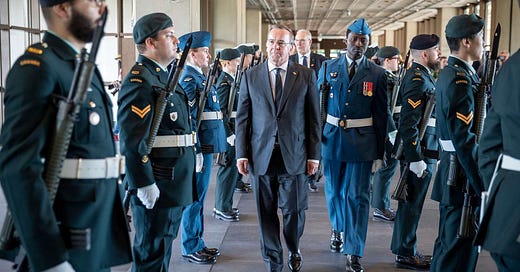Once again, Germany is the block for decisive progress in this sad story about Ukraine. However, the new Chancellor can be the person to remove the stop.
In the photos from yesterday’s summit in London, Germany’s acting Chancellor Scholz is decidedly in the background. It looks like he tries to melt into the background. In this extremely dangerous and decisive phase for the European Continent, Germany has been completely inactive with regards to public initiatives and any visions for the future of, say the European Union or even for Germany itself.
At the end of the London summit, British Premier Starmer announced the 4 points that forms the agreement of all participants:
to keep military aid flowing into Ukraine, and to keep increasing the economic pressure on Russia
that any lasting peace must ensure Ukraine's sovereignty and security and Ukraine must be present at any peace talks
in the event of a peace deal, to boost Ukraine's defensive capabilities to deter any future invasion
to develop a "coalition of the willing" to defend a deal in Ukraine and to guarantee peace afterwards (BBC)
Germany does not object to any of these points. But then, it is more of a checklist than an action plan. It needs to be filled in with plans and commitments. The moment Germany steps in, everything will become more clear. Scholz is more or less the Mr. Undecided and his very measured approach is nowhere near sufficient in this situation. But the winner of the recent election, Friedrich Merz, has indicated a much more clear standing in the situation. He may be admitted to the meetings in the near future. He sees the necessity for Europe to be able to stand alone, responsible for own defense and able to decisively support Ukraine against Russian aggression. Merz is a hardliner, much more than Merkel, his predecessor in the CDU party. The only question is how many concessions Merz will have to make to the center-left in order to achieve their support for a coalition. And it has to move fast.
Russia not leant back, yet
Russia, meanwhile, can lean back and enjoy the spectacle. Not quite, though. The debacle in the Oval Office came as a surprise to Kremlin, as much as for everybody else. So Russia was quite slow to react and then cautiously. Some of the usual hawks went on the attack, mainly on Zelensky, and joined into a media campaign to further undermine him.
This calculated approach from Russia seems to indicate that they are convinced that Germany is the real decisive factor. Russians have respect for Germany and sees it as a formidable adversary that Russia does not want to confront, especially now in the weakened state after the war of attrition against Ukraine.
It goes both ways - Kursk is not a happy place for the Germans to think about, but even if the Soviet Union won the final battle in the Kursk theater, Russians would rather preserve the memory untainted than seeing German tanks run into there again.
German Defense Minister (now, acting) Boris Pistorius is received with military honors in the Canadian Ministery of Defense during his visit in May 2024. Photo: ©Bundeswehr/Marc Tessensohn
Sondervermögen extraordinary funding for German defense
As reported in the German newspaper Bild yesterday, even before the formation of a new coalition government, the most likely coalition partners Union (CDU/CSU) and SPD are in urgent talks about am extraordinary budget measure to pour money into the ailing construction industry as well as defense. That proposal for a ‘Sondervermögen’ or special funds allocation may hit the Bundestag parliament withing days a weeks, if it is agreed upon.
It’s going fast because the situation demands it, in order to show real interest in the London four-points plan. Further, it’s going fast because once the new parliament is taking over, AfD will have the ability to block a special allocation decision. Sondervermögen requires a 2/3 majority in the Bundestag, and as AfD has 1/5 of the seats in the new assembly, it will almost certainly be blocked altogether. Timing is important, and even if forming the new government is important, getting the Sondervermögen in place first is optimal.
Kremlin fears it is running out of time to achieve result in Ukraine before the new German government is seated. Although not formed yet, the Merz government to-be signals clear intentions to make huge investments in arms that figuratively speaking will send another swarm of tanks to Kursk. Merz has also indicated clearly that he thinks Europe will stand up for itself and for Ukraine. Knowing it will take time and some tricky diplomacy with a flimsy emotional US government, it means that Russia very soon does no own the game any more.
As the Russian forces are near exhaustion, significant results on the ground are unlikely. Zelensky is severely weakened by the assault on him in the White House, but he immediately gained strength again from the unanimous support by other Western leaders. Russia must then apply (secret) diplomatic pressure to weaken his position, much of it in the form of a media campaign to discredit him. Europe seems shaken, but determined to take up the challenge, first with stirring up enough financial support to keep Ukraine going and step up its military and diplomatic power.





Not as long as Germany is afraid to fight and most parties are filled with Putin sympathizers
Should hope so!!!